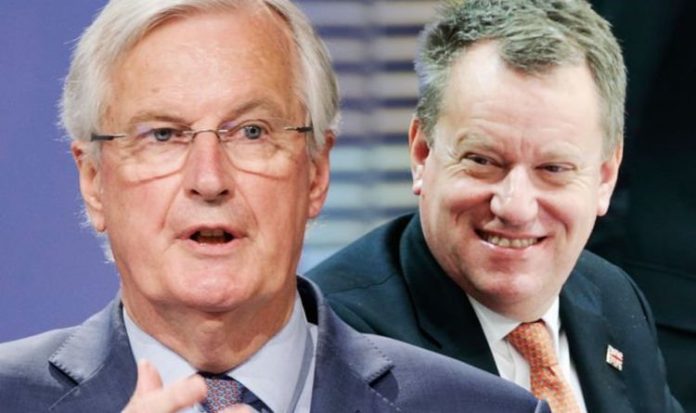Last week, Mr Barnier indicated a deal was now becoming less likely as the EU’s chief negotiator claimed the UK was wasting time. Several areas of divergence still remain between the two sides with a no deal Brexit becoming more likely. Speaking to Express.co.uk, former Conservative MEP and academic research director at the Institute of Economic Affairs, Syed Kamall claimed the UK’s position has taken away the EU’s initial advantage.
He said: “For much of the withdrawal agreement negotiations, the EU played hardball while the UK seemed to approach the negotiations as a friendly conversation with both sides aiming for a win-win scenario, so it’s reassuring to see the UK now taking a tough stance.
“Given that Michel Barnier had the upper hand for much of the negotiations, I am not surprised that he is complaining about the UK’s tougher stance.
“While we should aim to sign a UK-EU trade deal, this should not be at any price.
“Without an overall UK-EU trade agreement, we may see some sector-specific agreements where it is in both sides interest and uncontroversial.
“Many British companies trade on WTO terms with buyers and sellers in countries with which the UK and EU has no formal trade agreement, since both sides see mutual benefit.
“You would expect diplomats on both sides to warn of the dangers of no deal and to point figures at each other, since they’re just doing their jobs.”
Similar to Mr Barnier, the UK’s negotiator David Frost also concluded a no deal Brexit is now becoming more likely.
However, Mr Frost insisted the EU’s stance on the areas of divergence such as fisheries and state aid, has made it “unnecessarily difficult”.
JUST IN: Boris bolsters Brexit Britain: PM draws up 11-group panel for deals
The EU’s demands over state aid remain one of the biggest areas of divergence between the two sides.
Under this, the UK would remain tied to common rules and standards to stop businesses from undercutting rivals by operating in different countries.
The state of fisheries also remains unresolved amid the UK’s desire to reclaim its coastal waters after leaving the much-hated Common Fisheries Policy.
UK officials have claimed any desire for the UK to remain tied into EU regulations defeat the core principles set out throughout Brexit talks.
Mr Frost concluded: “We have been clear from the outset about the principles underlying the UK approach.
“We are seeking a relationship which ensures we regain sovereign control of our own laws, borders, and waters, and centred upon a trading relationship based on an FTA like those the EU has concluded with a range of other international partners, together with practical arrangements for cooperation in areas such as aviation, scientific programmes, and law enforcement.
“When the EU accepts this reality in all areas of the negotiation, it will be much easier to make progress.”
The next round of talks will resume in London on September 7.







